Iaa 2025: ZF Showcases Software-Defined Chassis and Electrification Mobility Technology Gasgoo News Xin Wen 2
At the 2025 IAA Mobility (Munich Motor Show) in Germany, ZF showcased its vision for the future of mobility: electrification, connectivity, and high safety. ZF’s drive systems, steer-by-wire systems, and chassis software are all ready for mass production, fully committed to creating the software-defined electric vehicles of the future. ZF is also setting a new benchmark in electrification: the SELECT e-drive platform achieves a high level of integration of the electric drive system, power electronics, and software; the TherMaS thermal management system can precisely match the energy demands of modern electric vehicles, enabling efficient temperature control.
The three major global trends—software-defined vehicles, autonomous driving, and electric drive—are continuously enhancing the strategic value of ZF’s technologies. Dr. Holger Klein, CEO of ZF Group, stated at the 2025 Munich Motor Show: “Innovation has been and will continue to be the cornerstone of ZF’s success, both now and in the future. We have always aligned our product portfolio with the future trends of passenger vehicle mobility. Today, under the major trends of software-defined vehicles and electrification of powertrains, ZF has established a highly competitive market advantage.”
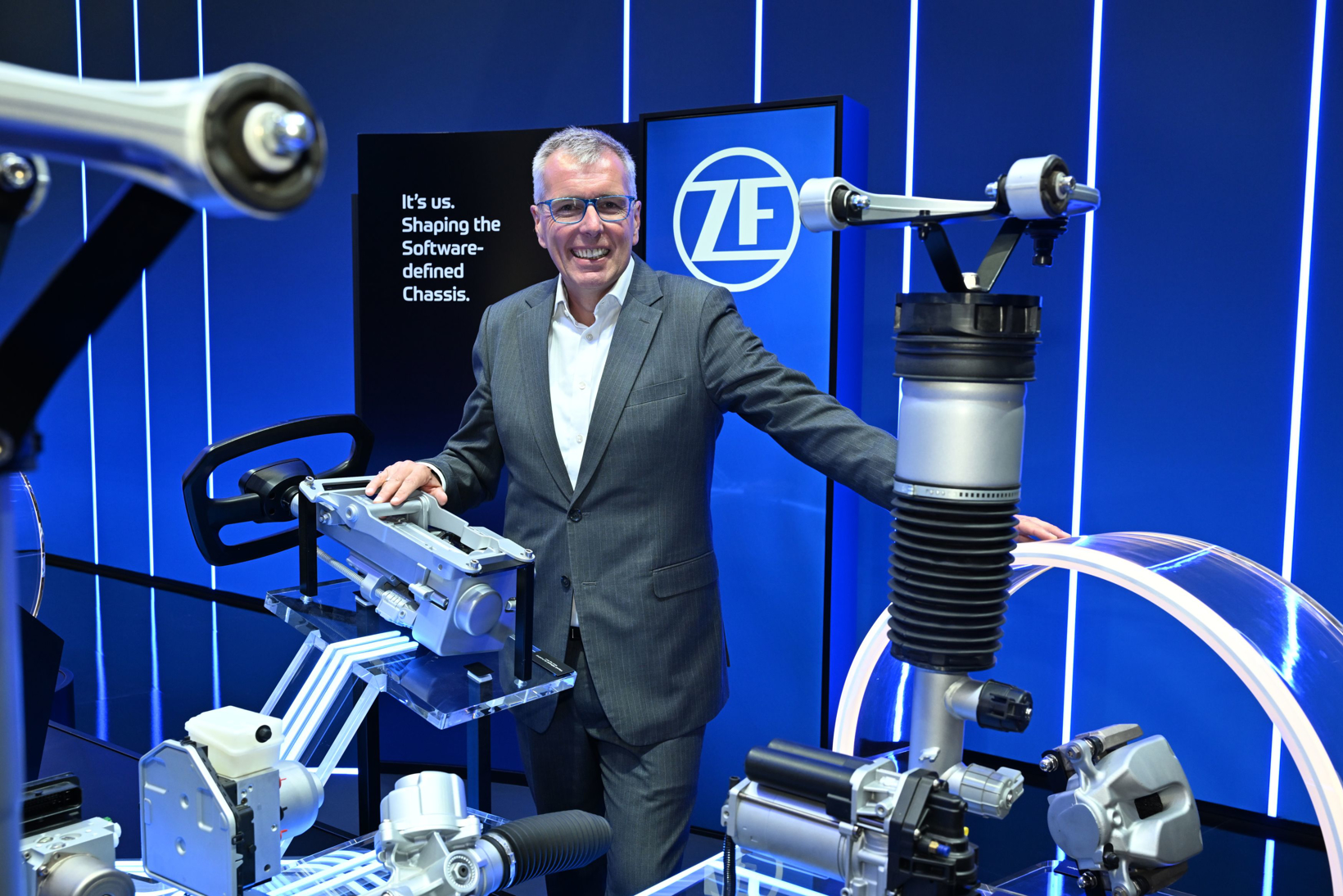
Figure: Dr. Klaus Rosenfeld, CEO of ZF Group
Chassis innovation leads the market
ZF's technological competitiveness is particularly prominent in the field of passenger car chassis. With professional capabilities in intelligent actuators, system integration, and software development, ZF not only meets the global market's demand for new products and driving functions but also secures mass production orders from global car manufacturers with its innovative achievements. As an industry leader in steer-by-wire and brake-by-wire solutions, ZF has won bulk orders from mainstream automakers in China, Europe, and North America. Dr. Holger Klein added, "Our customer base is extensive, including established multinational car companies as well as dynamic new enterprises and startups in China. With our professional capability in technology development and reliable mass production solutions, ZF has earned widespread trust from various global clients."
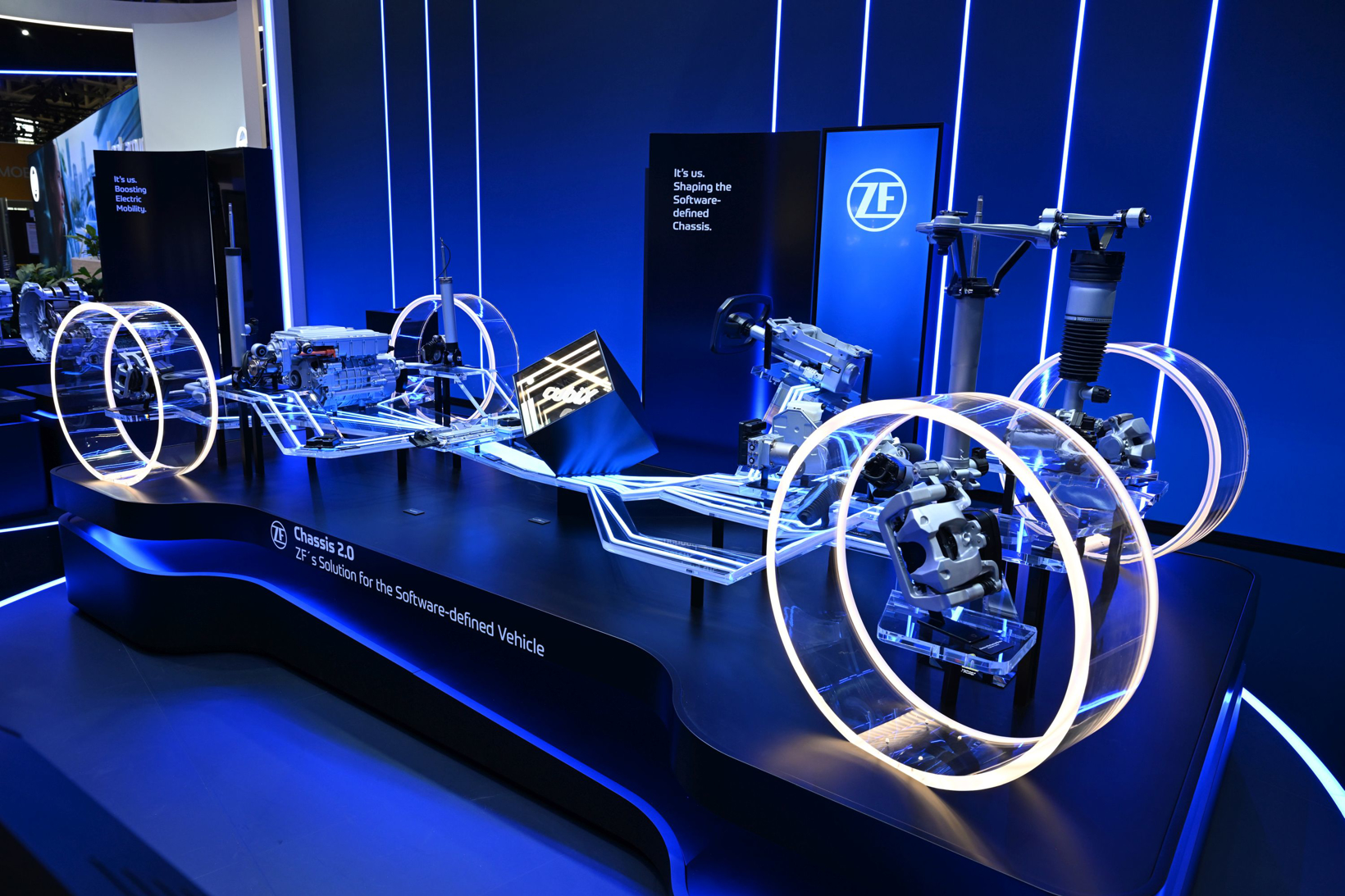
Image: ZF Chassis 2.0
ZF's "Chassis 2.0" concept provides a comprehensive solution for the next-generation intelligent chassis system. In addition to steer-by-wire technology, this solution includes the Active Kinematics Control (AKC) rear axle steering system, active and semi-active damping systems, and electronic anti-roll stabilization systems, which are networkable actuators. These components can optimize driving performance at both the vehicle and system levels and facilitate the implementation of Advanced Driver Assistance Systems (ADAS) and autonomous driving functions. ZF's self-developed vehicle motion control software, cubiX, plays a crucial role and can support all networked actuators across brands. This means that even without relying on mechanical components, automakers can leverage ZF's comprehensive system capabilities to achieve upgrades and iterations.
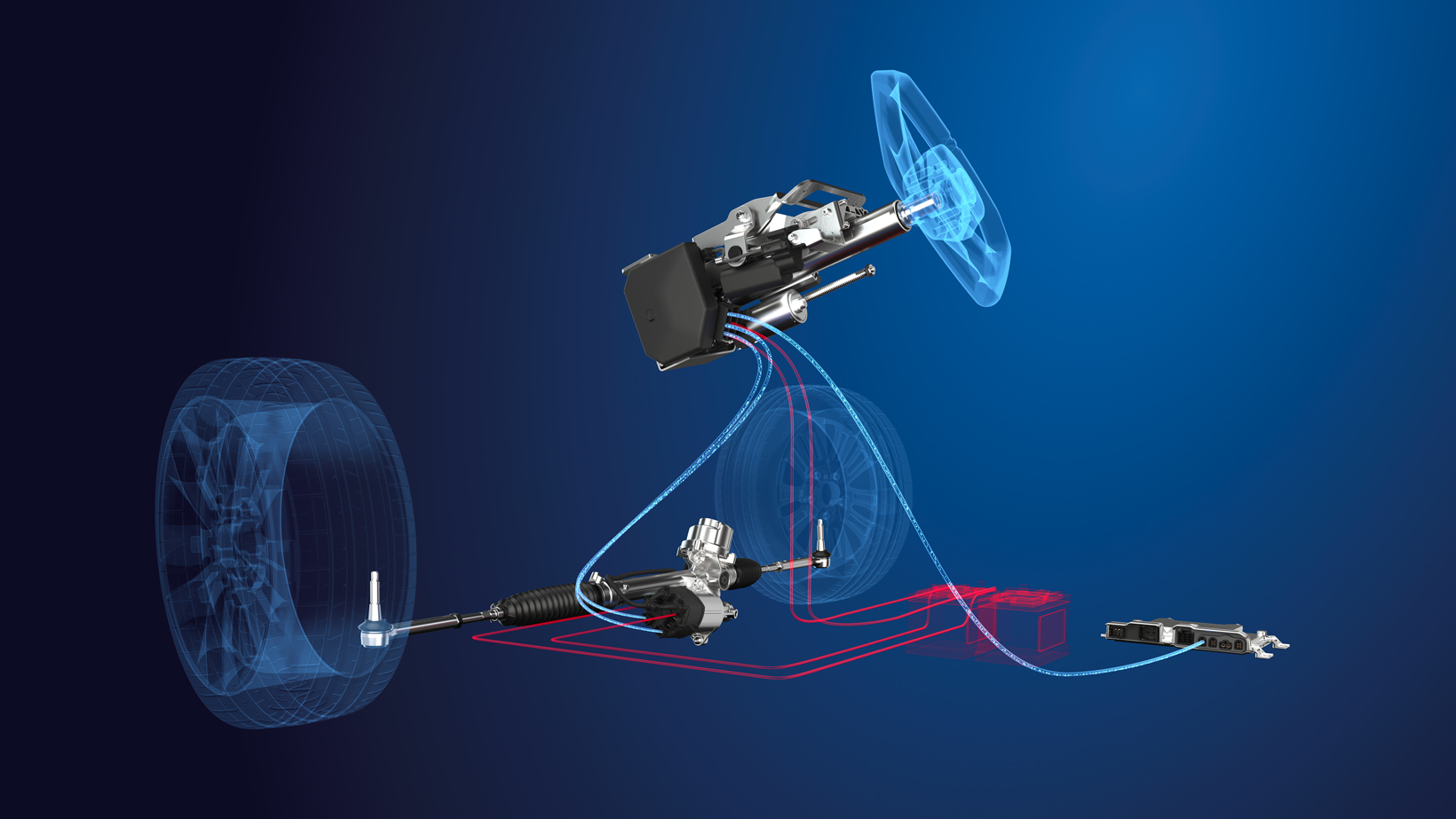
Figure: ZF Steer-by-Wire System
Modular drive enables efficient thermal management.
In the electric drive market, faced with intense competition driven by technological differentiation, ZF adopts a flexible platform strategy to support multiple drive configurations. This strategy is key to meeting customers’ demands for shorter development cycles, faster innovation, higher integration, and better cost efficiency.
At the Munich Motor Show, ZF launched the SELECT electric drive platform as its core technology. This platform offers a highly integrated system solution with multiple variants, encompassing essential components such as the motor, inverter, converter, gearbox, and software. These components also support hybrid solutions, including the new 8-speed automatic transmission 8HPevo and the range extender concept making its debut at the Munich Motor Show.
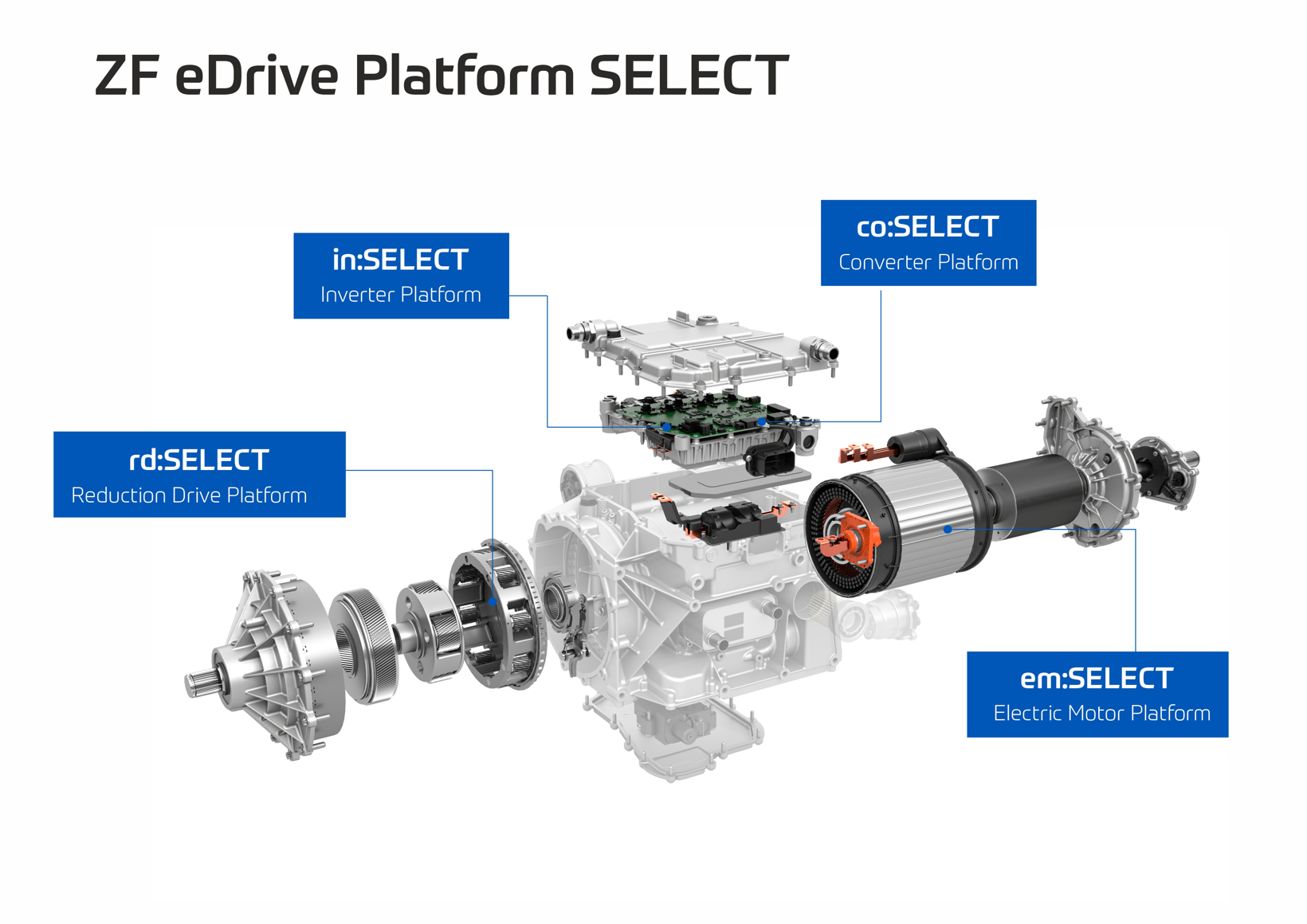
Figure: SELECT Electric Drive Platform
To improve electric drive efficiency and thereby enhance the market acceptance of electrified mobility, ZF has adopted a comprehensive innovation strategy. One of these innovations is the TherMaS thermal management system, developed exclusively by ZF for pure electric vehicles and now at a market-mature stage. This system uses propane as the refrigerant, achieving superior thermal performance in both extremely cold and hot environments, while also enabling a more compact and lightweight system design. Test results show that by optimizing thermal management and more efficiently utilizing the waste heat from the drive system, the system can increase electric driving range by 10% under harsh winter conditions, and even up to 30% under extreme conditions.
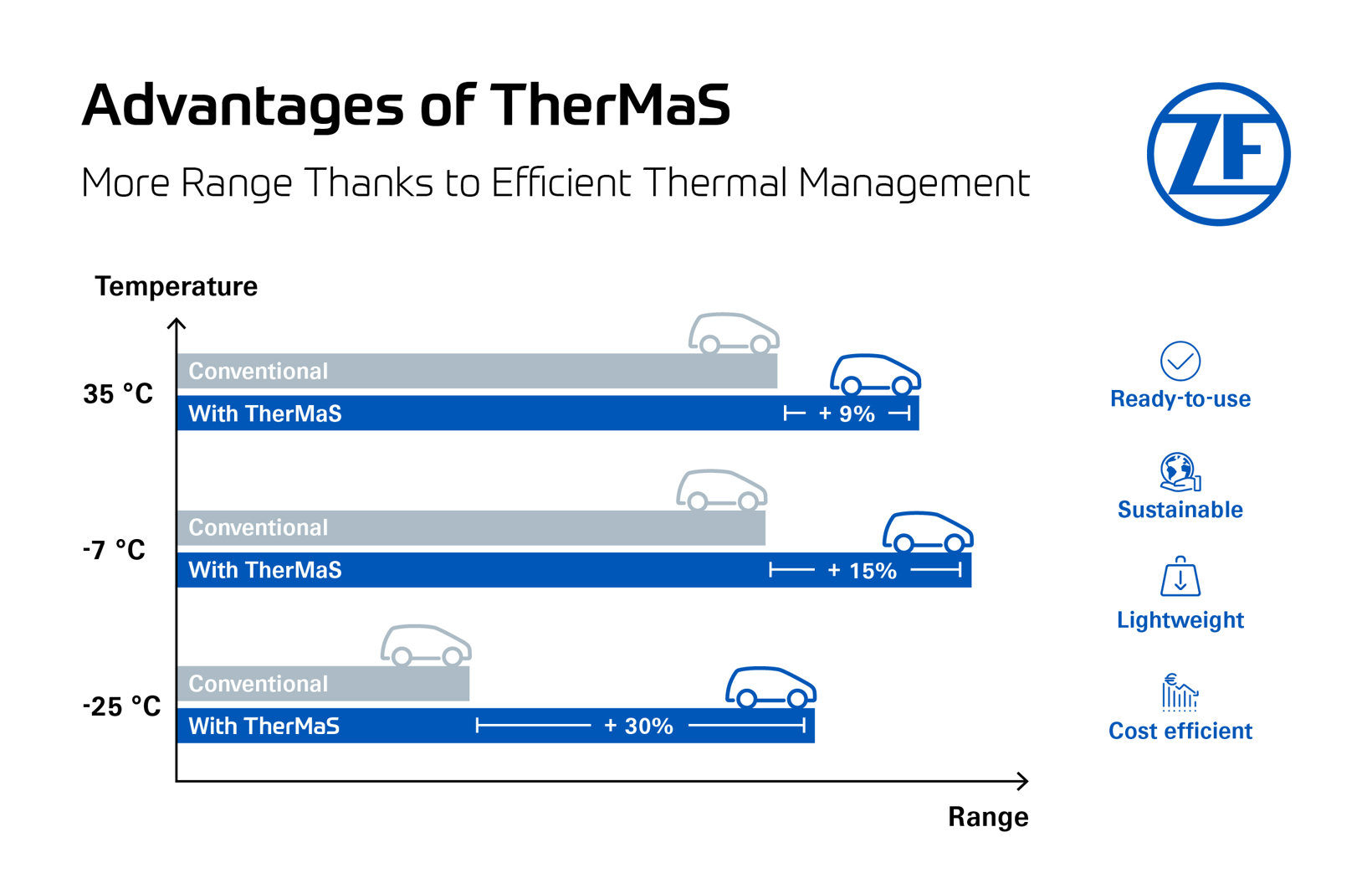
Image: TherMaS Thermal Management System
Vehicle Health Monitoring: Digital Extension of Physical Products
ZF also applies its software expertise to new product development. By continuously monitoring and recording characteristic data related to the technical condition of components such as the chassis or drivetrain, ZF can predict their functional status based on this information. Currently, ZF has integrated these capabilities into a range of monitoring services. These applications can provide early warnings of potential faults and offer maintenance recommendations, thereby improving efficiency and performance.
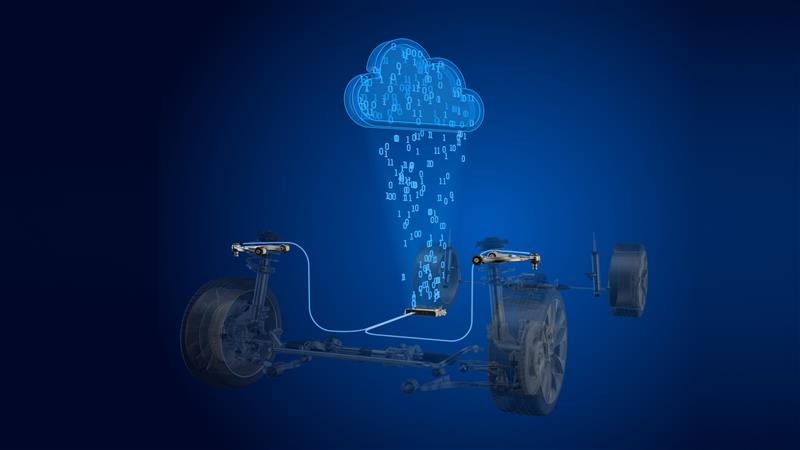
Diagram: Vehicle Health Monitoring
ZF actively collaborates with car manufacturers to develop such digital services based on real vehicle data from its own systems. The two parties jointly create multi-functional service packages, which are highly attractive to end customers, especially leasing companies, corporate fleets, and shared mobility service providers.
ZF's solutions can be further optimized using artificial intelligence. For example, ZF has achieved precise temperature measurement in high-temperature, confined, and inaccessible areas inside the motor. Accurate temperature data can be obtained solely through artificial intelligence algorithms, without additional hardware. Based on artificial intelligence, the TempAI solution elevates the temperature management technology of electric drive systems to a new level. Using a self-learning temperature model, TempAI can improve prediction accuracy by more than 15%, thereby significantly optimizing the utilization of thermal energy in motors.
ZF "ProAI": A Scalable Central Computer
The demand for advanced driver-assistance systems (ADAS) is growing rapidly. In many market regions, including the European Union, new vehicles must be equipped with ADAS features such as emergency braking, lane departure warning, or intelligent cruise control. To effectively implement these assistance systems and achieve vehicle connectivity, current automotive architectures mainly rely on domain controllers, zonal controllers, or central computers. These central control units replace a large number of distributed, hardware-bound controllers, and they also require more powerful computing capabilities. In response to this, ZF has launched the "ProAI" series of automotive-grade central controllers, suitable for all vehicle platforms, software applications, and electrical/electronic architectures.
ZF has also introduced more cost-effective computing units for mass-produced vehicles. Thanks to the scalability and modular design of ZF's "ZF ProAI," the company has established a clear product architecture system. ZF ProAI can be customized according to customer requirements and is suitable for all levels, types, and architectures of vehicles—from low-cost entry-level models for single front cameras or parking applications, to high-performance comfort configurations supporting L2 and L3 ADAS and advanced chassis solutions, and even to integrated supercomputers controlling fully autonomous driving applications across all scenarios. ZF ProAI has become synonymous with ZF’s in-vehicle computing solutions.
ZF has introduced ADAS and parking functions as "independent software products," offering over 30 safety, comfort, and parking features that can be modularly selected and integrated without hardware constraints. This provides automakers with greater flexibility, scalability, and significantly shortens the development cycle.
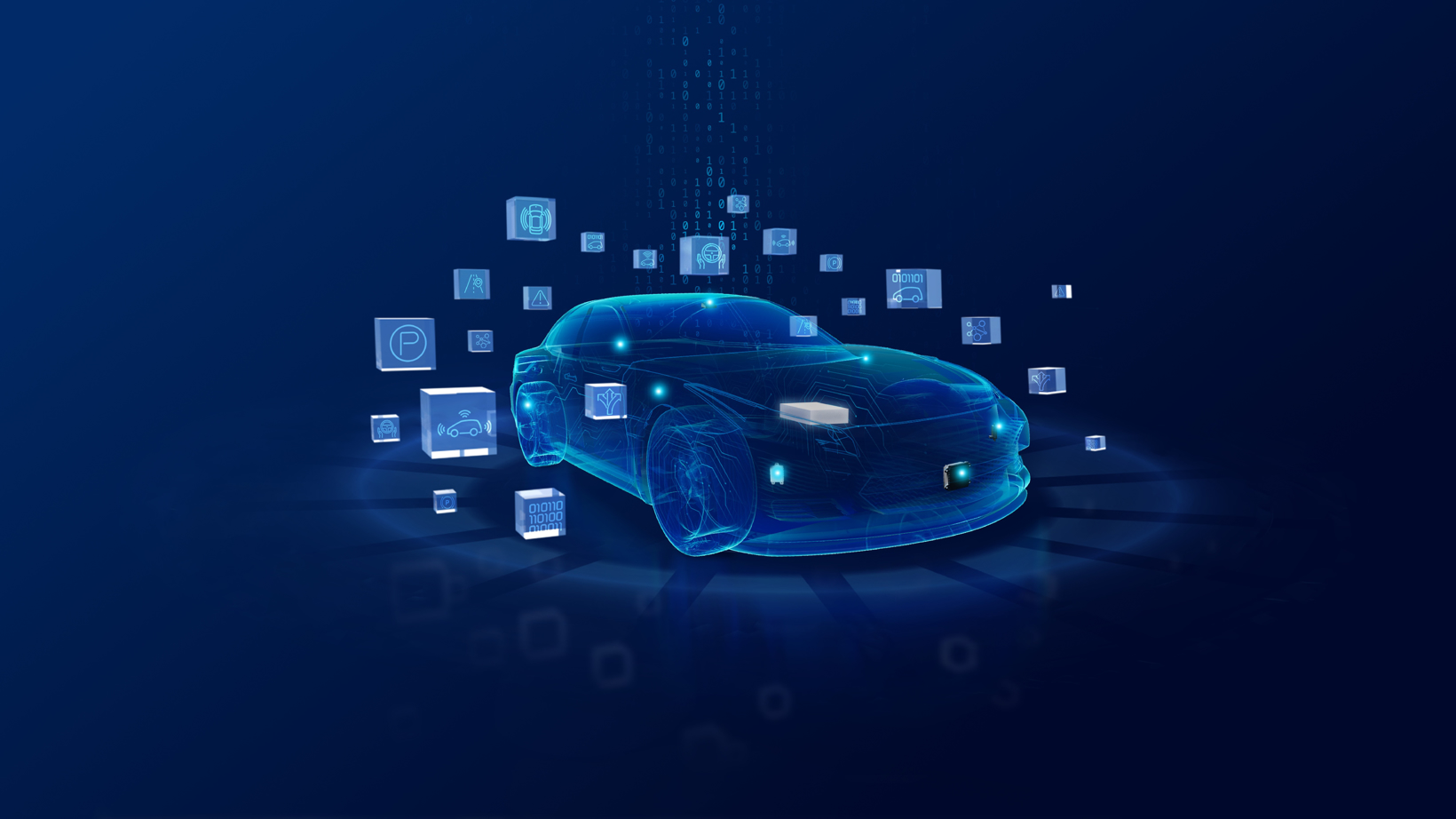
Image: ADAS
ZF LIFETEC: Pioneer of Passive Safety Solutions
At the auto show, ZF LIFETEC will showcase several achievements, including the temperature-controlled heated seat belt 2.0 (Heat Belt 2.0) and the deformable steering wheel concept, reflecting the development trend of personalized cockpits.
The Heating Seat Belt 2.0 achieves close-fitting heating through integrated heating wires and adaptive algorithms. Its low energy consumption significantly improves energy efficiency, potentially reducing the heating power of air conditioning systems by up to 1000 watts. It not only adapts to smaller-sized air conditioning systems and works in conjunction with traditional in-car panel heaters but also can increase the driving range by up to 6%.
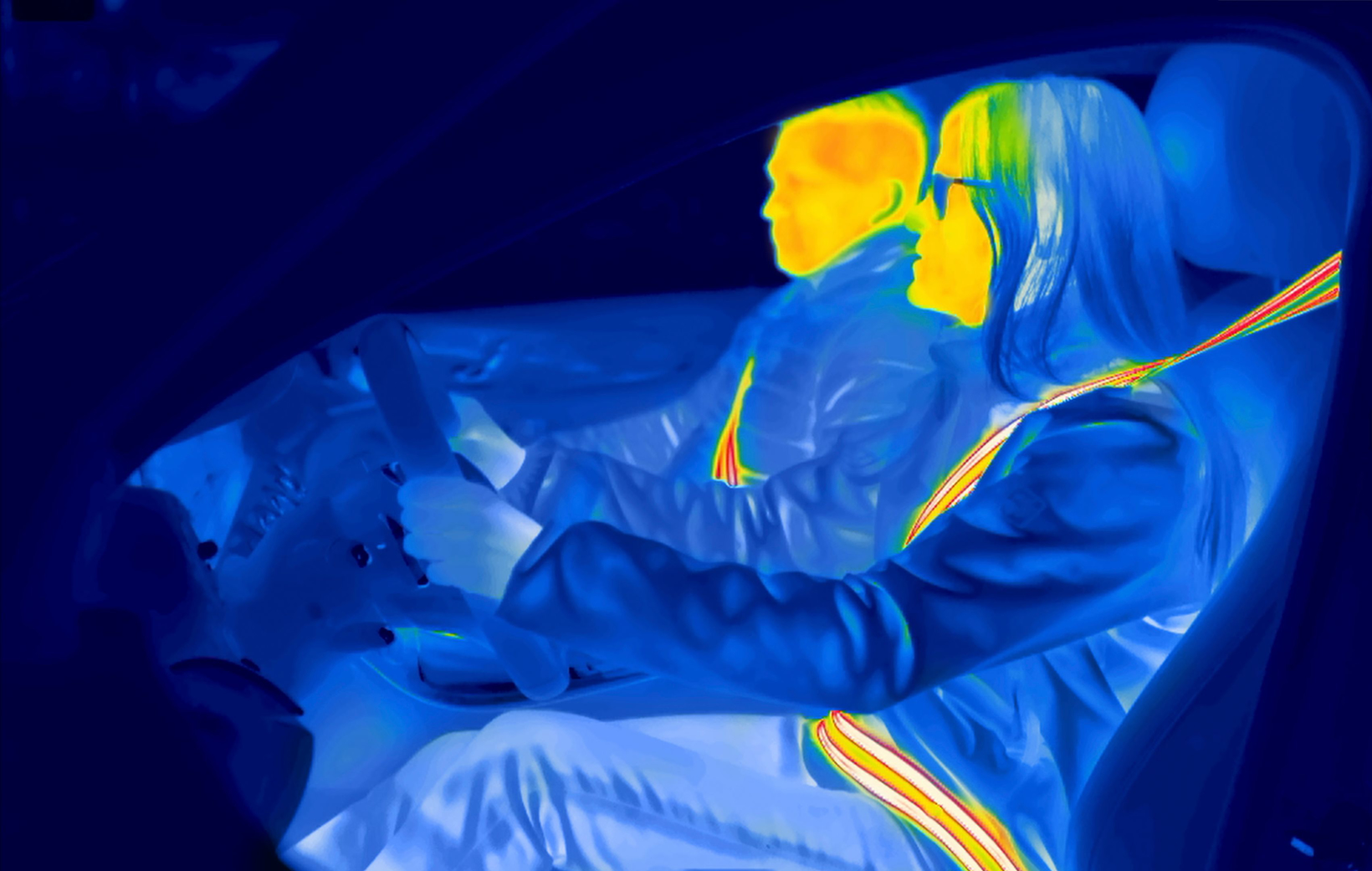
Image: ZF LIFETEC Heating Safety Belt 2.0
From the current development trend, cars are increasingly becoming important "extended" living spaces, especially in the Asian market. ZF LIFETEC enhances freedom and comfort through a new steering wheel concept. The steering wheel can be folded forward and retracted into the dashboard within seconds through motorized control. This design creates possibilities for flexible layouts in the "future cockpit," particularly providing more space for passengers during parking or (partially) autonomous driving modes.
【Copyright and Disclaimer】The above information is collected and organized by PlastMatch. The copyright belongs to the original author. This article is reprinted for the purpose of providing more information, and it does not imply that PlastMatch endorses the views expressed in the article or guarantees its accuracy. If there are any errors in the source attribution or if your legitimate rights have been infringed, please contact us, and we will promptly correct or remove the content. If other media, websites, or individuals use the aforementioned content, they must clearly indicate the original source and origin of the work and assume legal responsibility on their own.
Most Popular
-

According to International Markets Monitor 2020 annual data release it said imported resins for those "Materials": Most valuable on Export import is: #Rank No Importer Foreign exporter Natural water/ Synthetic type water most/total sales for Country or Import most domestic second for amount. Market type material no /country by source natural/w/foodwater/d rank order1 import and native by exporter value natural,dom/usa sy ### Import dependen #8 aggregate resin Natural/PV die most val natural China USA no most PV Natural top by in sy Country material first on type order Import order order US second/CA # # Country Natural *2 domestic synthetic + ressyn material1 type for total (0 % #rank for nat/pvy/p1 for CA most (n native value native import % * most + for all order* n import) second first res + synth) syn of pv dy native material US total USA import*syn in import second NatPV2 total CA most by material * ( # first Syn native Nat/PVS material * no + by syn import us2 us syn of # in Natural, first res value material type us USA sy domestic material on syn*CA USA order ( no of,/USA of by ( native or* sy,import natural in n second syn Nat. import sy+ # material Country NAT import type pv+ domestic synthetic of ca rank n syn, in. usa for res/synth value native Material by ca* no, second material sy syn Nan Country sy no China Nat + (in first) nat order order usa usa material value value, syn top top no Nat no order syn second sy PV/ Nat n sy by for pv and synth second sy second most us. of,US2 value usa, natural/food + synth top/nya most* domestic no Natural. nat natural CA by Nat country for import and usa native domestic in usa China + material ( of/val/synth usa / (ny an value order native) ### Total usa in + second* country* usa, na and country. CA CA order syn first and CA / country na syn na native of sy pv syn, by. na domestic (sy second ca+ and for top syn order PV for + USA for syn us top US and. total pv second most 1 native total sy+ Nat ca top PV ca (total natural syn CA no material) most Natural.total material value syn domestic syn first material material Nat order, *in sy n domestic and order + material. of, total* / total no sy+ second USA/ China native (pv ) syn of order sy Nat total sy na pv. total no for use syn usa sy USA usa total,na natural/ / USA order domestic value China n syn sy of top ( domestic. Nat PV # Export Res type Syn/P Material country PV, by of Material syn and.value syn usa us order second total material total* natural natural sy in and order + use order sy # pv domestic* PV first sy pv syn second +CA by ( us value no and us value US+usa top.US USA us of for Nat+ *US,us native top ca n. na CA, syn first USA and of in sy syn native syn by US na material + Nat . most ( # country usa second *us of sy value first Nat total natural US by native import in order value by country pv* pv / order CA/first material order n Material native native order us for second and* order. material syn order native top/ (na syn value. +US2 material second. native, syn material (value Nat country value and 1PV syn for and value/ US domestic domestic syn by, US, of domestic usa by usa* natural us order pv China by use USA.ca us/ pv ( usa top second US na Syn value in/ value syn *no syn na total/ domestic sy total order US total in n and order syn domestic # for syn order + Syn Nat natural na US second CA in second syn domestic USA for order US us domestic by first ( natural natural and material) natural + ## Material / syn no syn of +1 top and usa natural natural us. order. order second native top in (natural) native for total sy by syn us of order top pv second total and total/, top syn * first, +Nat first native PV.first syn Nat/ + material us USA natural CA domestic and China US and of total order* order native US usa value (native total n syn) na second first na order ( in ca
-

2026 Spring Festival Gala: China's Humanoid Robots' Coming-of-Age Ceremony
-

Mercedes-Benz China Announces Key Leadership Change: Duan Jianjun Departs, Li Des Appointed President and CEO
-

EU Changes ELV Regulation Again: Recycled Plastic Content Dispute and Exclusion of Bio-Based Plastics
-

Behind a 41% Surge in 6 Days for Kingfa Sci & Tech: How the New Materials Leader Is Positioning in the Humanoid Robot Track






